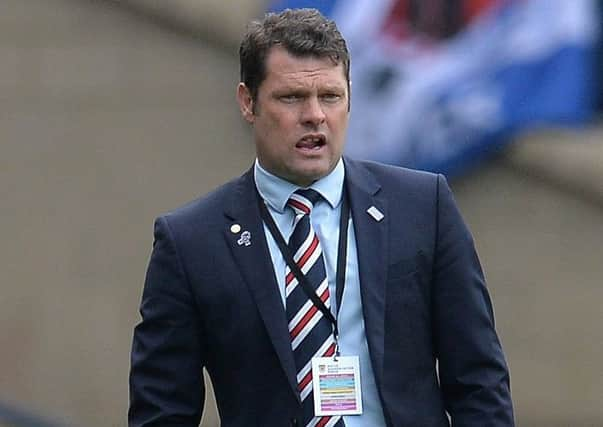Brendan Rodgers: Rangers instability has hurt Graeme Murty


Celtic manager Rodgers expressed his sympathy for Murty, who has endured a turbulent week in the dramatic aftermath of Sunday’s Old Firm Scottish Cup semi-final at Hampden.
Murty’s prospects of remaining in charge of Rangers beyond the end of the season look to have been shattered by his team’s capitulation in the 4-0 defeat, with the turmoil at the club extending to the suspension of experienced duo Kenny Miller and Lee Wallace for an alleged post-match altercation with the manager.
Advertisement
Hide AdAdvertisement
Hide AdAccording to Rodgers, the longer-term uncertainty over Murty’s position since he was placed in charge only until the end of the season has made it more difficult for him to command the necessary levels of control at Rangers.
“Graeme’s situation is different,” said Rodgers.“But you have to have authority. No matter what your position is, that is one of big things.
“The team has to know who is in control. Where it is different in Graeme’s situation is that he is only temporary until the end of the season and of course that is difficult. It is difficult for the group and it is difficult for the players because they are unsure.
“Any of us in any line of work will know that if you are working where it is not stable, then it is a lot more challenging than if there is stability. There is no doubt as a leader, whether you are a head coach or a manager, you need to have authority. Authority comes from how you work, from your role, your behaviour - but also through stability within your club.
“I have empathy for Graeme, of course, because up until last summer he was a guy that was a budding young coach who was building his career really well. Then he had the opportunity to go in to manage Rangers on a temporary basis and then, through the good work he did, he was given the opportunity through to the end of the season.
“He will have gained so much from it, however it goes for him at the end of the season. He has gained, in that period, about ten years worth of learning as a manager and that’s going to set him up for the rest of his career. Things will have happened on and off the field which, in management and coaching, you never learn from unless you’re in there.
“Even as a number two, you are close but it’s totally different. You never know until you become the manager. So there are a lot of things he will have learned in this period and it will benefit him going forward.
“Will it put him off (being a manager)? It all depends. Each manager goes into that situation and you get a feel for it. There is a huge professional pressure and an expectancy. I think what Graeme will have learned as a manager and leading, it is about managing expectations - of supporters, of boards, of players, of staff. He is doing it at a big club.
Advertisement
Hide AdAdvertisement
Hide Ad“However it is at the end of the season it will be better for him. It won’t feel like that now, because the spotlight is shining right on him, but he will be better for it whatever happens. He will see that at the right time.”
Rodgers insists he still reflects upon his sacking as Reading manager back in 2009 as a key moment in what has subsequently proved to be a successful career.
“I think of my time at Watford where I had a great time and then decided to leave when I was offered the Reading job,” he said. “Very quickly after that, I was out of work. I had a period of reflection and there were a couple of key items within that. I knew I could still work how I want to work but I learned things in that period that made me better going into the Swansea job. “Then you go into Liverpool and it is a different stratosphere in relation to the management of such a huge club. The experience there then helped me coming to Celtic, how you cope and manage all of that. It is experience, it is going through it and it is having those adverse moments as well. Otherwise there is no learning. If it is all hunky dory and it is all nice, there’s no learning. It is like my time at Celtic – we’ve lost games 7-0 and 7-1 in Europe. You have to then manage that to ensure your players can go again and they are not going to have the ill effects of it. That is management.”